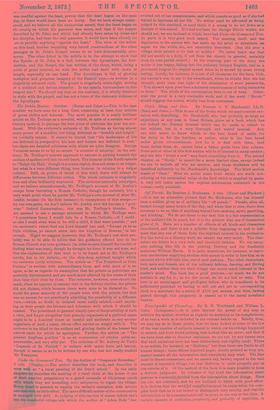Under the Greenwood Tree. By the Author of "Desperate Remedies."
2 vols. (Tinsley.)—The author describes his book, and describes it very well, as "a rural painting of the Datch school." In the early chapters he describes the meeting of a rural choir at the house of one of their number, preparatory to a grand serenade of Christmas carols with which they are intending, more antiguorurn, to regale the village. Every detail is painted, to employ the writer's metaphor, with minute care and with no little effect. The more difficult matter of the conversation is managed with skill. In judging of this one has of course before one's eye the wonderful village talk which the author of " Adam Bede " has evolved out of her consciousness, and which sounds as good as if she had waited in taprooms all her life. No writer need be affronted at being judged by this standard, or need think it a wrong to be set down as a disciple of this school. If it had not been for George Eliot's works, we should not, we are inclined to think, have had Under the Greenwood Tree. In parts it is very good work indeed. The meeting itself, and the deputation to the parson who has made up his mind to substitute an organ for the violin, tte., are admirably described. (But did ever a village choir submit to its fate so mildly ? We never knew one that did not secede in a body, if not from the church in general, certainly from its own parish church.) In the courting part of the story the writer is less happy, falling into the ordinary literary English, just as a provincial forgets his elegant speech when he is moved by some strong feeling. Surely, for instance, it is out of all character for the hero, Dick, the carrier's son, to say to his sweetheart, when he thinks that she has thought more than was right of the admiration of some passers-by, "You showed upon your face a flattered consciousness of being attractive to them." The whole of the conversation here is out of tune. Other- wise the novel is a very creditable work, and if the word " Dutch " should suggest the notion, wholly free from coarseness.


































 Previous page
Previous page